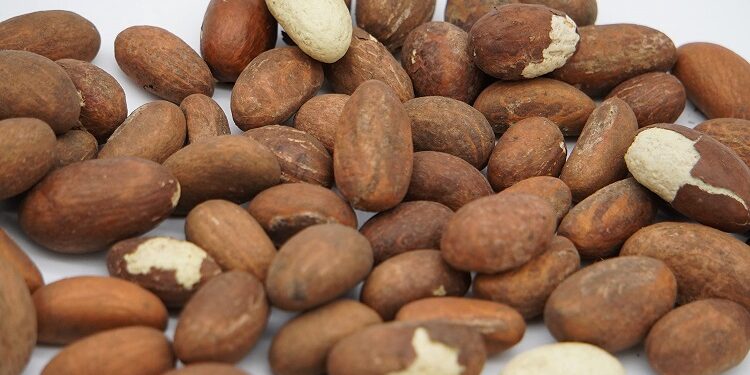Bitter kola, also known as bitter cola or Garcinia Kola, is a plant in Central and Western Africa. It has long been valued for its medicinal properties. Although traditional African medicine uses all parts of the Bitter Kola plant, the seeds are most commonly eaten.
Some of the first recipes for Coca-Cola were made using the bitter kola plant extract. Though the company hasn’t used actual kola to flavour their sodas in years, the name remains a reminder of the unusual plant that inspired the iconic drink.
Bitter kola seeds have a sharp, bitter flavour that eases into a slight sweetness as you chew and are typically eaten raw.
Health Benefits
Although bitter kola has been eaten in Africa for years, scientists are just beginning to study the health benefits of this flowering plant. According to these early studies, bitter kola may be able to help with health problems, including:
Infections
Bitter kola has been used over the years to fight infections from the common cold to hepatitis. A 2018 study showed that bitter kola can help combat coughs, bacterial infections, and viral infections. Eating bitter kola when an infection starts may help fight the disease and make you feel better more quickly.
Inflammation
Bitter kola seeds have commonly been chewed on in Africa to fight against inflammatory conditions like arthritis. One 2008 study showed that patients with osteoarthritis in their knees showed significantly reduced inflammation when eating bitter kola compared to a placebo. The high levels of potassium in bitter kola may be a contributing factor in reducing inflammation.
Diabetes
Early studies suggest that a chemical called kolaviron, found in bitter kola, may protect against hypoglycemia in people with type 2 diabetes. Although this first study was done on rats and has not yet been reproduced on humans, these early findings are promising.
Nutrients per Serving
The FDA considers bitter kola generally safe but classifies it similarly to essential oils. That means there’s not much information about serving sizes or nutritional data. However, a 2013 study found that bitter kola was high in the following nutrients:
- Carbohydrates
- Fat
- Protein
The study same study also found that bitter kola had high levels of:
- Vitamin C
- Calcium
- Potassium
- Iron
- Caffeine
The consumption of kola nuts might improve several health conditions.
Prostate cancer: Although extensive studies have not been conducted, early research indicates that certain compounds found in the kola nut may decrease the risk of prostate cancer. The research is still being debated, but it is thought that the phytoestrogens in kola nuts may kill cancer cells and stop tumours from growing.
Slow metabolism: People with a sluggish metabolism could benefit from using products that contain kola nuts. Conditions that may affect a person’s metabolism include low testosterone, Graves’ disease, and Cushing syndrome.
Migraines: The kola nut may be helpful for people with migraines. Migraines often affect the blood vessels in the head, and caffeine has been used to treat headache pain. The theobromine and caffeine in the kola nut may dilate or widen blood vessels in the brain, decreasing migraine pain.
Asthma: Although kola nuts may not be recommended as a treatment for respiratory conditions, they might be useful for people with specific breathing problems, such as asthma. The caffeine in kola nuts may act as a bronchodilator, opening the airways to make breathing easier.
Uses
The kola nut is chewed in certain African countries during ceremonies and rituals. It is also used to sweeten breath. Another application of the kola nut in the Western world is as a flavouring agent for sodas.
The kola nut is also an additive in energy drinks and performance enhancers. In some cases, it is used as an extract or powder.
The nut is boiled to extract the kola or it can be ground into a powder. The nut is an alternative medicine in certain parts of the world.
Risks
Kola nuts and products containing kola nuts may not suit everyone. Anyone who is allergic to nuts should also avoid kola nuts. An allergic reaction to kola nuts may include symptoms such as:
- hives
- upset stomach
- breathing difficulties
People with certain medical conditions might also be advised not to use products that contain kola nuts. For instance, kola nuts may not be suitable for people with high blood pressure or certain cardiac conditions due to their stimulant effect.
Anyone who has difficulty sleeping or staying asleep may also want to avoid the kola nut. The high level of caffeine in the nut and supplements containing it may stimulate the central nervous system and make sleeping difficult, especially for people sensitive to caffeine.
Side effects
The risk of side effects may vary and increase depending on how much of the nut is eaten. Possible side effects of the kola nut include:
- Increased blood pressure: Because the active ingredients in the kola nut stimulate the body, the nut can raise blood pressure. People with high blood pressure or are taking blood pressure medication should check with their doctor before using any product containing kola nuts.
- Problems sleeping: Using products containing kola nuts can lead to insomnia or difficulties falling or staying asleep. Those with sleep disorders may be advised to avoid stimulants that contain caffeine, including kola nuts.
- Shakiness: Kola nuts can affect the central nervous system, leading to shakiness, tremors, and anxiety. People with anxiety may be especially prone to shakiness from them.
- Nausea: Overeating kola nuts may lead to an upset stomach. Some people may also experience stomach pains because of the increased production of stomach acids, which kola nuts might cause.
Takeaway
Kola nuts may be a helpful natural remedy for some common conditions. However, as they contain substances that act as stimulants in the body, kola nuts may not be appropriate for everyone.
If products containing kola nuts are intended to treat medical conditions, people should talk to their doctors before consuming them. Kola nuts may interact with certain medications and may not be recommended.
People should remember to speak to a doctor before taking supplements containing kola nuts.










